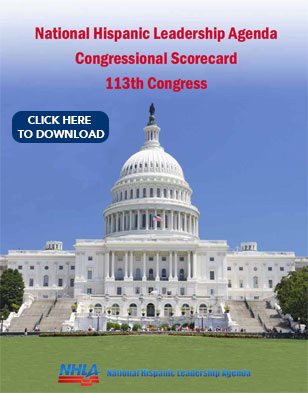PRESS RELEASE
FOR IMMEDIATE DISTRIBUTION
February 26, 2016
Leading Coalition of Latino Organizations Releases LGBTQ-Inclusive Policy Recommendations to Presidential Candidates and Federal Policymakers
Washington, D.C. - The National Hispanic Leadership Agenda (NHLA), a coalition of 40 of the nation's preeminent Latino advocacy organizations, released its quadrennial Hispanic Public Policy Agenda yesterday, a comprehensive outline of the policy concerns and priorities of the nation's Latino community.
The coalition urged the candidates for president, along with Congress and the current administration, to take careful note of the policy recommendations which affect the 58 million Latinos in the United States. Along with long-held positions on issues such as economic empowerment and immigration, the 2016 policy agenda includes policy recommendations specifically aimed at improving the well-being of LGBTQ Latinos.
The policy agenda covers the unique health challenges facing LGBTQ Latinos, as well as the need to protect LGBTQ Latinos from employment discrimination and abuse in immigration detention. In the criminal justice context, the coalition calls for better data collection that includes sexual orientation and for ending the use of solitary confinement for transgender and gender non-conforming individuals. This is the most explicitly LGBT-inclusive policy agenda produced by the NHLA to date.
“Our coalition’s intention has always been to advance the well-being and dignity of all Latinos, and this includes our LGBTQ brothers and sisters, with whom we proudly stand shoulder-to-shoulder in unity to overcome the particular challenges people face because of their sexual orientation or gender identity,” said Hector Sanchez, NHLA Chair and Executive Director of the Labor Council for Latin American Advancement.
“Since joining NHLA four years ago, I have been honored to be among a growing cadre of Latina leaders working to ensure that we fully embrace and include Latinas in a policy agenda that recognizes the challenges of gender-based discrimination and violence, and the importance of health care for women and LGBTQ Latino/as. This year’s agenda is the most gender-inclusive in the history of NHLA! The policy priorities outlined demonstrate a commitment to improving Latina reproductive health and rights, critical measures to expand health care access for LGBTQ Latino/as, to ensure that young parents have the resources needed to thrive, and to address HIV and AIDS within our communities, regardless of immigration status," Jessica González-Rojas, Co-Chair of the NHLA Health Committee and Executive Director at the National Latina Institute for Reproductive Health.
“Despite our nation's extraordinary progress on LGBTQ equality in recent years, significant challenges still remain, and, too often, Latina and Latino members of the LGBTQ community face greater and more serious discrimination as they are targeted both because they are LGBTQ and because they are Latino or immigrant or poor,” said Thomas A. Saenz, NHLA Vice Chair and President and General Counsel of MALDEF. "We see this in employment discrimination, in hate crimes, in educational discrimination, and in the deplorable treatment of LGBTQ Latino and Latina immigrants in detention."
The NHLA debuted the 2016 Hispanic Public Policy Agenda yesterday at a press conference in front of the U.S. Capitol in Washington, D.C. The coalition will reach out to the major parties’ platform committees and hold events at the Republican and Democratic National Conventions to promote its priorities. The organization's board has already met with several presidential candidates and will continue its efforts to ensure that candidates and officials understand the priorities of the Latino community.
The LGBT-related recommendations in NHLA’s policy agenda include:
- Expanding the president’s proposed Deferred Action for Parents of Americans and Lawful Permanent Residents (DAPA), which is currently on hold while under Supreme Court review, to halt deportations of LGBTQ immigrants who meet most of the criteria of the program but don’t have children and would therefore be ineligible for relief.
- Increasing protections from abuse for LGBTQ immigrants in detention and the use of alternatives to detention, as they are the safest options for LGBTQ immigrants.
- In cases where transgender individuals must be detained, Immigration and Customs Enforcement’s policy should be to place the individual in housing that is consistent with the individual’s gender identity, not the anatomy or sex assigned at birth.
- Improving data collection in the criminal justice system, including improved data collection by sexual orientation.
- Prohibiting the use of solitary confinement for transgender and gender non-conforming people.
- Enhancing protections against employment discrimination on multiple bases, such as national origin and LGBTQ identity.
- Enacting the Health Equity and Accountability Act to eliminate health disparities for communities of color and subpopulations that face widened disparities due to gender identity, sexual orientation, and other factors.
- Supporting policies that provide LGBTQ Latinos health insurance coverage and access to gender-affirming care that is culturally competent.
- Opposing discriminatory healthcare policies that impact the Latino LGBTQ community.
- Increasing funding for data collection efforts and continuing to collect adequate data to help close the disparities gap in LGBTQ populations, including communities of LGBTQ persons of color, LGBTQ immigrants, and other LGBTQ populations.
- Removing arbitrary transgender-specific exclusions from all health plans, including state Medicaid programs.
- Ensuring the enforcement and implementation of Section 1557 of the Affordable Care Act, the non-discrimination provision that bans sex discrimination in health care programs and which would also provide protection on the basis of gender identity and sexual orientation.
- Encouraging health care providers to increase their knowledge of personal bias and increase their understanding of multiple issues that victims of violence, including homophobia and racism, in order to provide accessible and tailored care.
MEDIA CONTACTS
Estuardo Rodriguez | This email address is being protected from spambots. You need JavaScript enabled to view it. | (202) 631-2892
Brenda Arredondo | This email address is being protected from spambots. You need JavaScript enabled to view it. | (202) 587-4945
###
